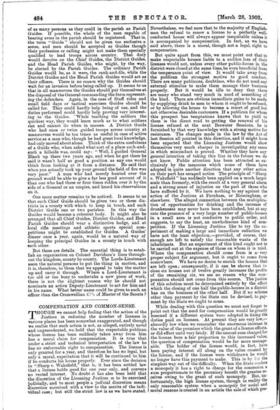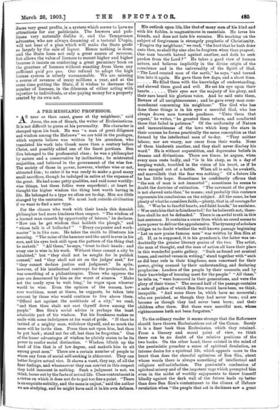COMPENSATION AND COMMON-SENSE.
didiaally, and to most people a judicial discretion' means discretion exercised with a view to the merits of the indi- vidual case ; but still the strict law is as we have stated. Nevertheless, we feel sure that to the majority of English, men the refusal to renew a license to a • perfectly well. conducted house will always appear inequitable unless it is accompanied by compensation. In fact, as we have said above, there is a moral, though not a legal, right to compensation.
But quite apart from this, we must point out that to make respectable houses liable to a, sudden loss of their licenses would not, unless every other public-house in the district were closed at the same time, be even beneficial from the temperance point of view. It would take away from the publican the strongest motive to good conduct. There are many publicans, doubtless, who do not need any external stimulus to make them manage their business properly. But it would be idle to deny that there are many who stand very much in need of something of the kind. There are obvious immediate gains to be made by supplying drink to men to whom it ought to be refused, or by allowing the house to become a resort of good but not otherwise desirable customers. If a publican for whom this prospect has temptations knows that to yield to them is the direct road to getting the renewal of his license refused at the next Brewster Sessions, he is furnished by that very knowledge with a strong motive for resistance. The changes made in the law by the Act of last Session all pointed in this direction, and it might have been expected that the Licensing Justices would show themselves very much sharper in investigating any cases in which misconduct is proved. Whether they have any general intention of taking this line in the future we do not know. Public attention has been attracted so ex- clusively by the measures which some of them have adopted in quite another direction that any other action on their part has escaped notice. The principle of " Sharp v. Wakefield " has suddenly been applied on a much larger scale than formerly, with the result of a very general alarm and a strong sense of injustice on the part of those who have suffered by it. We have nothing to say against the action of the Justices at Farnham, or Birmingham, or elsewhere. The alleged connection between the multiplica- tion of opportunities for drinking and the increase of drunkenness may never have been established, but at any rate the presence of a very large number of public-houses in a small area is not conducive to public order, and suggests, to say the least, an unwholesome kind of com- petition. If the Licensing Justices like to try the ex- periment of making a large and immediate reduction we have not the least objection,—provided, of course, that enough are left to satisfy the reasonable wants of the inhabitants. But an experiment of this kind ought not to be carried out at the expense of those on whom it is tried. Where the compensation should come from is a- very proper subject for argument, but it ought to come from somewhere. We have no desire to enrich the houses that are left open; consequently, if it can be shown that to close six houses out of twelve greatly increases the profits of the remaining six, we see no reason why the com- pensation should not come from this source. The justice of this solution must be determined entirely by the effect which the closing of one half the public-houses in a district has on the business of the other half. But if no scheme other than payment by the State can be devised, to pay- ment by the State we ought to come.
While dealing with this question we must not forget to point out that the need for compensation would be greatly lessened if a different system were adopted in fixing the duties paid on licenses. At present they are very low,— absurdly low when we remember the enormous increase in the value of the premises which the grant of a license effects, or did effect until very lately. If the annual sum charged for the license bore a fair proportion to this increased value, the question of compensation would be far more manage- able. The holder of the license would, in fact, have been paying interest all along on the value created by the license, and if the license were withdrawn be would no longer have this payment to make. This is by Er the simplest way out of the difficulty. When the State confers a monopoly it has a right to charge for the concession a sum proportionate to the pecuniary benefit the grantee re- ceives owing to the grant of such monopoly. Bu. t, un- fortunately, the high license system, though in reality the only reasonable system when a monopoly for social and moral reasons is created in an article the sale of which pro- duces very great profits, is a system which seems to have no attractions for our politicians. The brewers and pub- licans very naturally dislike it, and the Temperance advocates, who are always dreaming of a teetotal Utopia, will not hear of a plan which will make the State profit so largely by the sale of liquor. Hence nothing is done, and the State loses not only a great source of revenue, but allows the value of licenses to mount higher and higher because it insists on conferring a great pecuniary boon on the grantees of licenses without exacting from them any sufficient quid _Fro quo. Our refusal to adopt the high license system is utterly unreasonable. We are missing a source of revenue of many millions a year, and at the same time putting the State, if it wishes to decrease the number of licenses, in the dilemma of either acting with injustice to individuals, or else paying money for a property created by its own act.











































 Previous page
Previous page